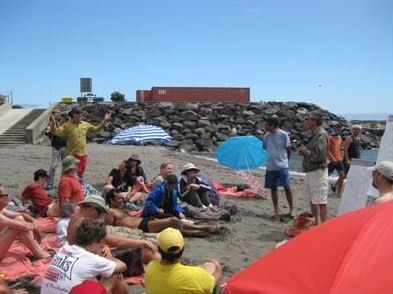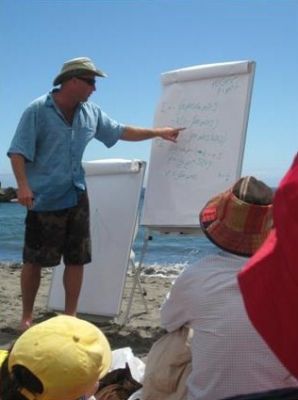Yes, you read the title of this post correctly. Yesterday at the FQXi conference, Paul Davies gave an argument for why we should detonate a nuclear bomb on Mars--in an effort to _find_ life.

The light-hearted session was already fairly surreal--taking place on the beach at Ribeira Quente rather than in a conference room, following an expedition to view whales and dolphins. (The photo, courtesy of Hyung Choi, shows Tanmay Vachaspati and Paul Davies (both standing on the right) taking questions.) Chairman (deck-chairman?) Max Tegmark opened the floor (sand?) for discussion of slightly off-the-wall ideas that could get people arguing and Davies obliged.
Davies began with an "optimistic" estimate that if life exists on Mars, then it's probably in microbe form living at least 200 meters underground. Since we don't have the prospect for drilling that deep into the planet for signs of life anytime soon. Davies suggested that we should send in a nuclear missile then follow with a Viking-style lander to examine the resulting crater.
You can guess that there were a few objections. Garrett Lisi opened with the most obvious first question: "Won't the probe just show that Mars is a barren nuclear wasteland?" No, says Davies, the missile won't kill life deep underground, just uncover it.
Davies was quick to acknowledge other reasons against the plan; many think it's a terrible suggestion because it involves "an act of violence against a neighboring planet." ("What if they nuke us back?" asked Tegmark.) But, added Davies, it was no worse than sending an unsterilizised probe up there, as we have already done. (Tegmark: "In other words, we've already sent up bio weapons, so why not send up nukes?)

Maulikh Parikh worried about the fallout, but Davies replied that the environment is already pretty radioactive.
Peter Byrne quipped that "it would just mutate the Martians--and turn them into us!"
Davies finished by lamenting that while he advocates the idea, he's found it hard to get support from others.
Glenn Starkman joked that a way to get support would be to explode a nuclear bomb on Earth first and just blame the Martians for it...
The idea was put to vote and it came back 50/50. Feel free to add your own opinion.
By then, Tegmark had thought of an alternative use for any spare nuclear warheads that might be at the disposal of foundational physicists. He proposed using it in an extension of the "Quantum Suicide Experiment" (which Cristi Stoica has been discussing to great effect in the "Ethics in the Many Worlds Scenario" thread).
In the thought experiment's conventional form, a physicist hoping to test if parallel universes exist rigs up a "quantum gun" such that when the trigger is pulled it either fires or sticks based on the results of the measurement of the spin of a quantum particle. She then points it at her head and pulls the trigger. According to the many worlds interpretation of quantum mechanics, the universe splits in two each time the particle's spin is measured, with one universe corresponding to each outcome. In one universe the physicist lives; in the other she dies. This continues each time she tries to kill herself. So, if the physicist finds herself pulling the trigger again and again, and yet still living, it would serve as evidence for the many worlds interpretation. (Please do not try this at home!)
"The problem with this," explained Tegmark, "is that only the physicist is convinced." To rectify this, Tegmark proposed sharing the joy of discovery by involving a larger number of people in the quantum game, using a quantum nuclear bomb rather than a quantum gun.
Strangely, nobody was keen to volunteer for such an experiment. Tevian Dray let Tegmark down gently by explaining that "in the current global financial climate, it may be best to combine both your experiment and Paul Davies'--we'll send you to Mars with the nuclear bomb and you can perform your quantum suicide experiment there."
Other speakers brave enough to talk on the beach were Tanmay Vaschaspati (video footage to come...) and Lisi (photo courtesy of Hyung Choi), who inkeeping with his desire to keep everything "exceotionally simple," gave a cheap and cheerful 5-minute derivation of quantum mechanics from information theory.
